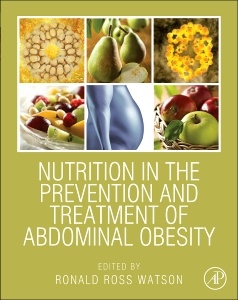Description
Nutrition in the Prevention and Treatment of Abdominal Obesity
Coordinator: Watson Ronald Ross
Language: English
Subjects for Nutrition in the Prevention and Treatment of Abdominal...:
560 p. · 21.5x27.6 cm · Hardback
Description
/li>Contents
/li>Readership
/li>Biography
/li>Comment
/li>
Nutrition in the Prevention and Treatment of Abdominal Obesity focuses on the important roles that exercise, dietary changes, and foods play in promoting as well as reducing visceral fat. Nutritionists, dieticians, and healthcare providers seeking to address the abdominal obesity epidemic will use this comprehensive resource as a tool in their long-term goal of preventing chronic diseases, especially heart, vascular, and diabetic diseases.
Experts from a broad range of disciplines are involved in dealing with the consequences of excessive abdominal fat: cardiology, diabetes research, studies of lipids, endocrinology and metabolism, nutrition, obesity, and exercise physiology. They have contributed chapters that define a range of dietary approaches to reducing risk and associated chronic diseases. They begin by defining visceral obesity and its major outcomes; they also discuss the importance and the challenges of dietary approaches to reduce abdominal obesity, as compared to clinical approaches, with major costs and risks.
SECTION 2: Visceral Obesity: Diabetes and Heart Disease
SECTION 3: Clinical Surgery in Management of Abdominal Obesity
SECTION 4: Nutrition in Clinical Therapy of Abdominal Obesity Diseases
SECTION 5: Exercise and Environment in Altering Abdominal Obesity
SECTION 6: Foods and Visceral Fat Accumulation and Removal
SECTION 7: Herbs and Extracts: Role in Abdominal Fat
SECTION 8: Dietary Supplements and Visceral Obesity
SECTION 8: Dietary Supplements and Visceral Obesity
SECTION 9: Dietary Macromolecules and Abdominal Obesity
SECTION10: Nutrients as Modulators of Visceral Fat
SECTION11: Hormones and non-Nutrients as Modulators of Visceral Fat
SECTION12: Dairy Products and Visceral Fat in Health
SECTION 13: Genetic Regulation and Mechanisms of Obesity
(55 total chapters)
Academic, government, and corporate researchers in nutrition, diet, and endocrinology; graduate students in nutrition, epidemiology and public health; and practicing nutritionists, dietitians, and endocrinologists.
- Offers detailed, well-documented reviews outlining the various dietary approaches to visceral obesity with their benefits and failures
- Includes chapters on types of foods, exercise, and supplements in reducing obesity and its chronic clinical companions, especially diabetes and cardiovascular disease
- Helps nutritionists, dieticians, and healthcare providers approach patients in making decision about nutritional therapies and clinical treatments for abdominal obesity, from an evidence-based perspective




